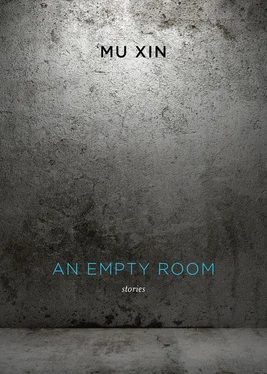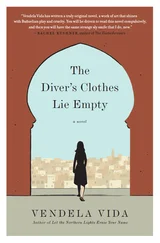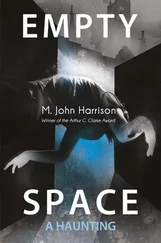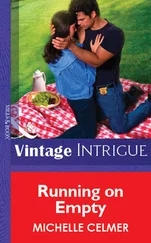Mu Xin - An Empty Room
Здесь есть возможность читать онлайн «Mu Xin - An Empty Room» весь текст электронной книги совершенно бесплатно (целиком полную версию без сокращений). В некоторых случаях можно слушать аудио, скачать через торрент в формате fb2 и присутствует краткое содержание. Год выпуска: 2011, Издательство: New Directions, Жанр: Современная проза, на английском языке. Описание произведения, (предисловие) а так же отзывы посетителей доступны на портале библиотеки ЛибКат.
- Название:An Empty Room
- Автор:
- Издательство:New Directions
- Жанр:
- Год:2011
- ISBN:нет данных
- Рейтинг книги:3 / 5. Голосов: 1
-
Избранное:Добавить в избранное
- Отзывы:
-
Ваша оценка:
- 60
- 1
- 2
- 3
- 4
- 5
An Empty Room: краткое содержание, описание и аннотация
Предлагаем к чтению аннотацию, описание, краткое содержание или предисловие (зависит от того, что написал сам автор книги «An Empty Room»). Если вы не нашли необходимую информацию о книге — напишите в комментариях, мы постараемся отыскать её.
In Our Time
An Empty Room
An Empty Room — читать онлайн бесплатно полную книгу (весь текст) целиком
Ниже представлен текст книги, разбитый по страницам. Система сохранения места последней прочитанной страницы, позволяет с удобством читать онлайн бесплатно книгу «An Empty Room», без необходимости каждый раз заново искать на чём Вы остановились. Поставьте закладку, и сможете в любой момент перейти на страницу, на которой закончили чтение.
Интервал:
Закладка:
I believe my aunt and uncle weren’t so withdrawn in their youth. When the occasional visitor drops by, I overhear them speak about who has moved, who has been successful, who is suffering from a strange illness, who is still doing what before death. . details, distinctly remembered, mingle in the cross sections of the distant past. It is said that the older one grows the further one’s memory reaches into the deep past. I’ve also noticed a common mistake the visitors, men or women, invariably make: all of them compliment the host, remarking how he doesn’t look his age and how he retains his youthful appearance, while they really should offer this sort of bouquet to the hostess. Or they should say something like, “Neither of you looks your age” or “Both of you have retained your youthful appearance.”
Aunt is thus jealous of her husband, often casting a cold glance at him as if sizing up a stranger, as if she were calculating how much substance the compliment contained and how much was meant to flatter.
Uncle is quite content with himself. Those compliments have convinced him that refusing to look old is his natural obligation. He is so meticulously neat and tidy that he will not relax his appearance even at home. He has fine taste in ties, and he wears sock garters. But his greatest advantage is that he doesn’t gain weight anymore. Though he wears a belt, his old clothes still fit. In my eyes, however, he’s still a conservative old gentleman who shows many signs of decay. Those visitors his age are crotchety ancients, mocking themselves, admitting they’ve seen better days. Mere children during World War II, they are serious about everything, much more serious than our generation.
Although Aunt supposedly started dieting five years ago, her weight hasn’t changed. She seems to be suspended in her rotund state, and it is unlikely she will ever be slim. But as her shape is more or less fixed, she continues the ritual of afternoon tea and biscuits once or twice a month.
“I suppose someone is coming for a visit today?” Aunt asks.
“I doubt anyone is,” says Uncle.
“Are you not going out?”
“Where to? I am going nowhere,” he says. “Would you like to go somewhere for fun?”
“The weather isn’t so good. . But I wouldn’t want to even if the weather were good.”
“We haven’t done anything outdoors for a long time,” he says, trying to improve her reasoning.
“I always feel depressed when we return,” she sighs.
“So do I,” he echoes.
“That is a nice tie. Is it new?”
“The narrower type is in fashion. I don’t know when I bought this one. Too wide. It’s better not to wear it often. It doesn’t match my shirt.”
“Wasn’t the narrow type in fashion some time ago?”
“Toward the end of the ’50s, yes.” With his thumb and index finger he draws the shape of a narrow tie on his chest.
Aunt is just as devoted to her appearance. Sometimes she asks me, “What is the latest fashion, Alice? I don’t have time to go shopping. Can’t you help me find a few things from my closet that bears some resemblance to current trends?”
I admire her thinking, for fashion is nothing but a cycle of renewing the old. Advertisers and designers are quite shrewd. Every time they create a new trend, they make a few additions and deletions so the old, in its new form, seems unfamiliar. That’s why I feel sorry for Aunt. Luckily, she only tries to catch up with the latest fashion at home, which spares her public embarrassment. So I always choose a few things that look similar to new designs. This pleases her. She looks at herself in the mirror and smiles, saying, “Are you certain this is popular again? It was fashionable a long time ago, when I was in my forties.”
She is flattered by her own foresight and by the fact that she can still fit, albeit with some difficulty, into her old clothes. Evidently, she has been quite plump for much of her life.
Aunt continues to sit in the living room, her back straight. Her fashionable clothes enhance her energy. She still waits for her husband to acknowledge the hint in her words. “A narrower tie makes one feel more sprightly than the wider type, doesn’t it?”
“Perhaps you’re right.”
“And if you simply do without a tie?”
Uncle feels the sting of her words and says in his own defense, “I’m accustomed to it and wouldn’t feel as comfortable with the collar loose.”
She accepts his compromise. “That’s true. Take sleeves. I don’t like when people roll up the long sleeves of their shirt. Why not simply wear short sleeves then? It doesn’t look nice with long sleeves rolled up.”
“That’s indeed more proper. Such people have no sense of. . grammar .”
So Uncle will continue to wear his ties and be grammatical.
Aunt turns to me. “How long has it been since we last had tea?”
“About ten days.”
“How about today, then?”
“Sure, I’ll see to it. What do you think, Uncle?”
“Fine with me.”
The occasional afternoon tea doesn’t require much preparation. The whole ritual is essentially for looking at fine china and silverware adorned with a little sugar, a few biscuits, a little jam, and milk. It isn’t the preparation that makes me feel dread. It’s the anticipation that I’ll again be subjected to Aunt’s well-rehearsed story.
According to custom, I do not arrange the tea set on the table before I invite the masters of the house to take their seats. They must be seated face to face at the table in expectation for me to bring out the tea set on a tray and place each item not only in the right spot but in the right sequence. When tea is served, I have to ask, with fake innocence, “Would anyone care for some butter?”
Aunt then shakes her head and Uncle is silent.
“What about a tiny bit of cheese?”
“No, thank you. But I wouldn’t mind if you have some.”
This is sufficient indication that Aunt is in a good mood. She usually desires nothing more than the sound of “butter” and “cheese.” In this way she is able to express slight mourning so that her mild sadness can be a lot sweeter. Although I will inherit their house in the future, my present role is that of servant and companion. Before, after I just moved in, I was in a constant state of anxiety. As time passed, things became easier to deal with, though neither of them has made a will yet.
Afternoon tea is almost over. After a silent pause, the casual atmosphere of sipping tea and chewing biscuits begins to fade into space. In the darkening twilight, Aunt’s voice rises: “That day, I remember it was October 26th, the air-raid siren started at one o’clock in the afternoon, and the all-clear was heard at three. You came home at seven o’clock. Minus the hour on the road, there were three unaccountable hours. Where were you during that period of time?”
Uncle doesn’t flinch.
It’s customary that on Aunt’s face there’s an expression of confidence that she’ll receive an answer, and on Uncle’s face the indication of determination that he won’t reply. Twilight is darkening. After afternoon tea and such conversational reverberations, one becomes aware of how the twilight darkens or, rather, how it thickens to the point of being stagnant. Aunt is still; Uncle is still; and I, too, am still.
Only as Aunt stretches herself does Uncle adjust his position slightly and I begin to move my limbs. It’s an old rule of the house that the master doesn’t turn on or off the light in the living room. Instead she shouts, “Alice! Turn on the light, please!” or “You can turn off the light in the living room now, Alice!”
While I wait for the order, twilight fades into night. The tips of their silhouetted noses vaguely glisten. Their expressions are already invisible.
Читать дальшеИнтервал:
Закладка:
Похожие книги на «An Empty Room»
Представляем Вашему вниманию похожие книги на «An Empty Room» списком для выбора. Мы отобрали схожую по названию и смыслу литературу в надежде предоставить читателям больше вариантов отыскать новые, интересные, ещё непрочитанные произведения.
Обсуждение, отзывы о книге «An Empty Room» и просто собственные мнения читателей. Оставьте ваши комментарии, напишите, что Вы думаете о произведении, его смысле или главных героях. Укажите что конкретно понравилось, а что нет, и почему Вы так считаете.












